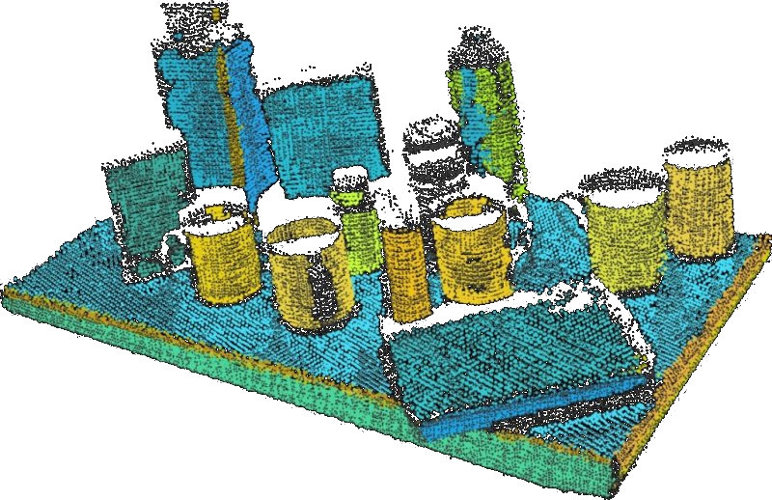Case study: filter a Point Cloud faster
Point Cloud Library (PCL) is a very popular library used in robotics, autonomous vehicles and 3D perception in general. Its contribution to this fields is huge.

It is a behemoth with more than 12K commits and 5K Github stars.
With about 400 contributors you would think that it is hard to find opportunities for optimization in plain sight, even more inside the most frequently used functions.
Me: Muahahahaha (Evil laugh)
The ConditionalRemoval filter
I bet that anyone that has been playing around with PCL has used pcl::ConditionalRemoval at least once.
From the official tutorial:
// slightly changed for clarity
using namespace pcl;
auto range_cond = std::make_shared<ConditionAnd<PointXYZ> ();
range_cond->addComparison (
std::make_shared<FieldComparison<PointXYZ>("z", ComparisonOps::GT, 0.0));
range_cond->addComparison (
std::make_shared<FieldComparison<PointXYZ>("z", ComparisonOps::LT, 1.0)));
// build the filter
ConditionalRemoval<PointXYZ> condition_removal;
condition_removal.setCondition (range_cond);
condition_removal.setInputCloud (input_cloud);
// apply filter
condition_removal.filter (*cloud_filtered);
Basically, we create the condition which a given point must satisfy for it to remain in our PointCloud. In this example, we use add two comparisons to the condition: greater than (GT) 0.0 and less than (LT) 1.0. This condition is then used to build the filter.
Let me rephrase it for people that are not familiar with PCL:
- An object is created that says: "the Z value of the point must be greater than 0.0".
- Another object is created saying: "the Z value of the point must be less than 1.0".
- They are both added to a
ConditionAnd. - We tell
ConditionalRemovalto use this combined condition. - Apply the filter to an input cloud to create a filtered one.
Now think that the usal Point Cloud has a number of points in the order of tens of thousands or more.
Think about it:

Seriously, take some minutes to think how, given a vector of points that looks like this:
You want to create another point cloud with all the points that pass this condition:
0.0 < point.z < 1.0
I mean, if you ask me, this is what I would do, because I am not that smart:
auto cloud_filtered = std::make_shared<PointCloud<PointXYZ>>();
for (const auto& point: input_cloud->points)
{
if( point.z > 0.0 && point.z < 1.0 )
{
cloud_filtered->push_back( point );
}
}
Before showing you a benchmark that will knock your socks off (don't worry, I will),
I must admit that it is an unfair comparison because the pcl filters
do many more checks when processing your data to prevent weird corner cases.
But do not forget that we expressed our conditions like this:
pcl::FieldComparison<pcl::PointXYZ> ("z", pcl::ComparisonOps::GT, 0.0)));
pcl::FieldComparison<pcl::PointXYZ> ("z", pcl::ComparisonOps::LT, 1.0)));
If you think about it, there must be some kind of parser "somewhere".
The easiest implementation of a parser is of course a switch
statement, but no one would ever do that for each of these trillion points...
Indeed, 2 switch statements called for each point of the cloud.
Summarizing: the very fact that these function tries to be "too clever" using these "composable rules", means that the implementation is inherently slow.
There is nothing we can do to save them. Nevertheles, we can replace them ;)
Davide, give me speed AND expressive code.
Sure thing, my friend!
Since pcl::FieldComparison is intrinsically broken (so are all the other Conditions in the library),
because of their switchstatements, let me write my own pcl::Condition (must be derived from pcl::ConditionBase) like this:
template <typename PointT>
class GenericCondition : public pcl::ConditionBase<PointT>
{
public:
typedef std::shared_ptr<GenericCondition<PointT>> Ptr;
typedef std::shared_ptr<const GenericCondition<PointT>> ConstPtr;
typedef std::function<bool(const PointT&)> FunctorT;
GenericCondition(FunctorT evaluator):
pcl::ConditionBase<PointT>(),_evaluator( evaluator )
{}
virtual bool evaluate (const PointT &point) const {
// just delegate ALL the work to the injected std::function
return _evaluator(point);
}
private:
FunctorT _evaluator;
};
That is literally all the code you need, no omissions.
I am simply wrapping a std::function<bool(const PointT&)> inside pcl::ConditionBase. Nothing else.
This is the old code:
auto range_cond = std::make_shared<ConditionAnd<PointXYZ> ();
range_cond->addComparison (
std::make_shared<FieldComparison<PointXYZ>("z", ComparisonOps::GT, 0.0));
range_cond->addComparison (
std::make_shared<FieldComparison<PointXYZ>("z", ComparisonOps::LT, 1.0)));
And this is the new one, where my condition is expressed in plain old code:
auto range_cond = std::make_shared<GenericCondition<PointXYZ>>(
[](const PointXYZ& point){
return point.z > 0.0 && point.z < 1.0;
});
The rest of the code is unchanged!!!

Let's talk about speed
You may find the code to replicate my tests here.
These are the benchmarks based on my sample cloud and 4 filters (upper and lower bound in X and Y):
-------------------------------------------------------------
Benchmark Time CPU Iterations
-------------------------------------------------------------
PCL_Filter 1403083 ns 1403084 ns 498
Naive_Filter 107418 ns 107417 ns 6586
PCL_Filter_Generic 668223 ns 668191 ns 1069
But the lessons to learn are:
- The "naive" filter might be an option in many cases and it is blazing fast.
- The "safe"
pcl::ConditionalRemovalcan still be used if you just ditch the builtinpcl::Conditionsand use instead the much more concise and readableGenericCondition.